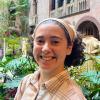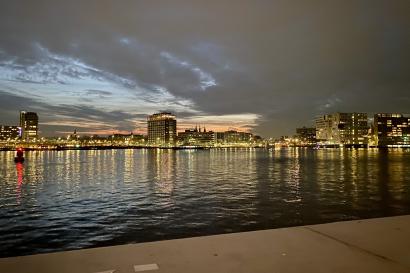
“Be brave, be curious, be determined, overcome the odds. It can be done.” - Stephen Hawking, Brief Answers To The Big Questions.
There are butterflies in the canal. I could reach them from my seat in the open boat that is currently gliding along the Plantage Muidergracht, which runs between the Roeterseilandcampus and the Amsterdam Business School. With every ripple created by the boat, the butterflies shapeshift. Their wings shimmer and turn iridescent against the gold-lit facade of the 18th-century building behind them.
“A butterfly in Brazil could cause an earthquake in Texas,” says the boat captain, steering us down the canal. He’s quoting (somewhat incorrectly) meteorologist Edward Lorenz, whose work inspired the artist Masamichi Shimada, who then created these seven butterflies for the Amsterdam Light Festival and called them simply “Butterfly Effect.” The festival’s 2019 theme is “DISRUPT”; Masamichi has created a metaphor for the unpredictable power of the smallest actions (Source: Amsterdam Light Festival).

It’s my 122nd day in Amsterdam; this time next week, I’ll be home. My mornings are occupied with packing and preparations, but my evenings are devoted to those last few Amsterdam things I need to do before I leave, which is why I’ve spent the last hour on this boat, watching light art. Some of the installations are familiar from my daily commute; they feel like old friends. The feathered, twinkling bomb poised at the edge of the Oosterdok; the bright bulbs layered over the Skinny Bridge, turning it into a Picasso-esque line drawing; the luminous wolves on the outskirts of Artis Zoo, surrounding silhouettes meant to represent the Jews who hid in animal enclosures there during WWII. Many of the installations carry sobering, necessary messages, but they’re also placed in the city’s highest-trafficked areas, their implications distilled into the transient crowds around them.
But that’s Amsterdam. Nothing here exists in a vacuum - everything around us is an amalgamation of “culture and history and stories and places and darkness and flaws and creatives and progress and injustice and beauty and rebels and magic and most of all, people”. I anticipated that intersectionality in my first blog post, four months ago, and the Netherlands delivered. This entire semester, I’ve found myself confronted by crossroads and contradictions. I’ve wondered how to reconcile how utterly safe I feel walking Amsterdam’s streets as a brown woman with the Dutch right-wing attitudes towards immigrants and difference, which I've explored in depth through my classes and my fieldwork. I’ve bought ceramic tulips for my family from shops that have “traditional” (read: blackface) Sinterklaas ornaments stacked on the next shelf. I’ve stood in museums and looked at my country’s colonial name on 17th-century Dutch maps, and then said doei doei, fijne dag to the receptionist on my way out.



Here and now, in this particular contradictory moment, our boat is emerging from the mouth of the Nieuwe Herengracht. The National Maritime Museum looms opposite us, its facade striped with laser lights that represent rising global temperatures. Last week, a Dutch friend asked me if I’d been there yet. I told them I didn’t intend intend to visit at all, that I couldn’t justify paying to see yet another glorification of the so-called Golden Age (of colonialism). For now, we sail past the replica East Indiaman moored on the quay; I study the ship’s looming masts, wonder what the coastline of my country looked like from that vantage point, 350 years ago.
The last exhibit we view is a simple billboard, adorned with the words All The Light You See Is From The Past. “It means that by the time you see my face, I’m already a split second older,” declares the boat captain. I am warmed by a thrill of recognition, think of the book that is never absent from my carry-on luggage, cosmologist Stephen Hawking’s seminal A Brief History of Time. “We do not know what is happening at the moment farther away in the universe; the light that we see from distant galaxies left them millions of years ago,” Hawking wrote. “Thus, when we look at the universe, we are seeing it as it was in the past.”

The universe is so much vaster and so much older than we’re comfortable thinking about, and yet the last few months have taught me that people worldwide find it incredibly difficult to let go of the human past, “the way things were”, even if that outlook causes irreparable damage to other humans. We all have to do our part to move out of the past and change the narratives around us. That starts, I think, with realizing that we are a part of whatever community we find ourselves in, however briefly - that we are complicit in what happens there. The smallest actions and reactions matter. The small child who shoves past you on the street isn’t rude - she’s just running to meet her dad, who’s getting off the tram with his arms already open. The boisterous dogs on the pavement in front of you aren't hurting anyone, only begging their owners to play a little longer. The lady in hijab at the bus stop will make room for you on the bench. Maybe she lives next door; maybe it's her first week in town. Smile, sit down, say assalamualaikum and hoe gaat het met u? The world is all around us, and we have far more power to change it than a butterfly's wings.
When the boat docks in the Oudezijds Voorburgwal, it’s begun to rain. The captain hands passengers up out of the canal, bidding each one a merry Goedenacht! I pull up my hood and wend my way through De Wallen, towards the bright lights of Prins Hendrikkade. My Dutch friends avoid this part of Amsterdam, but it's one of my favourite neighbourhoods to spend a last evening; slipping through narrow alley-streets, boots ringing on rain-slick cobblestones, watching for new wonders around every corner.
There’s a new book in my backpack. De antwoorden op de grote vragen. It’s the Dutch translation of the book Hawking wrote 30 years after his first one - Brief Answers to the Big Questions. When the silver-haired assistant in the bookstore saw me holding it, she smiled and told me, “We also have some thrillers and sci-fi over there.” I smiled at her kindness, didn’t say that decoding the secrets of the universe, as presented by one of the greatest minds of our time, in a language I picked up in four months, was thrilling enough.
There is a discrepancy about this book’s translated title to which I keep returning. It’s not a direct translation - not Brief Answers, but The Answers. There’s a surety to it, a confidence. As I rush through my last days in Amsterdam, it seems like an appropriate connection to make.
I’ve had to come up with a lot of answers this semester for questions I hadn’t considered before, or considered enough. Some were mundane, prompted by daily concerns like how to eat healthy on a budget. The answer, it transpires, is to walk to four different supermarkets to buy milk, broccoli, detergent and toothbrushes - which seems excessive, but is something that would be impossible back home. Some questions were personal, like making the choice between companionship and unhealthy situations - and there were no easy answers. But I’ve walked out of more unwelcoming social gatherings this semester than I ever have in my life and my mental health has never been better.
And then there are some questions that are bigger than that. Am I doing enough to create the world I want to live in? Am I striking the right balance between exploring the world as long as I can and still maintaining my relationships? Am I leaving more than I take from places? I’m not sure yet. But I know I’m trying - and I’m more confident than ever that I want to do the best I can. I don’t want the Brief Answers. I want De Antwoorden.

The bus is late, but it’ll be here sooner or later. On the other side of the world, in my garden in Katugastota, Sri Lanka, all the butterflies are asleep. I wait under winter trees and watch the chaos of Centraal Station, the lit-up facade of the Openbare Bibliotheek, the dome of the Nicolaskerk - three places I knew would be my sanctuaries from the first moment I saw them. I will remember them the way they made me feel long after I leave Amsterdam, along with the motto that got me here, now memorized in my newest language.
“Wees dapper, nieuwsgierig, vastbesloten, overkom de tegenslagen. Het kan.”

Shanela Ranaraja
<p>My name is Lalini Shanela Ranaraja. I grew up in Sri Lanka, a tropical island-nation blessed with perpetual summer, and yet I ended up going to college nine thousand miles away, in Rock Island, Illinois! I’m studying anthropology, journalism and creative writing because I couldn’t pick just one. In my spare time, I dabble in languages (I speak four), browse art supply stores, and people-watch. I require at least one long, rambling walk a day, even if there’s eight inches of snow on the ground.</p>






